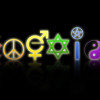Millennials: Religion is Out…Real Faith is In!
The recent Pew Report (November 2011) made some interesting observations about Millennials. The report specifically addresses the topic of politics. One of the categories caught my attention, noting the perceived role of religion as a key to our Nation’s success.
I suggest you go directly to the report for the complete comparison as well as other insightful information. The bottom line is that less than half (46%) of millennials see religion playing a major role. This compares with 64% for Gen X, 69% for Boomer and 78% for Builder (Silent) generations.
Personally this does not surprise nor does it alarm me. As I work with students across this nation I find that Religion is Out … Real Faith is In! They are not looking for a church, denomination, clergy or even a religious belief system to change the country.
In fact they are not looking for any of those to change their lives either…they are looking for a relationship. That relationship usually begins with a person who then introduces them to the Person of Jesus Christ. Relationship begets (now there’s a good Bible word) relationship.
Millennials want a real faith with a real Person not a religion or ritual. That is why personal evangelism is so vital. It begins with one person introducing another person to the Person of Jesus Christ. This may be done one on one or in a group but it is imperative that we never let our student ministries stop sharing their real faith.
Word of Life is committed to sharing the Gospel around the world. Whether it be one on one or in large arenas, we want to give people an opportunity to say “Yes” to Jesus and real faith. This month our Local Church Ministries is sharing the good news through an event called Superbowl with approximately 30,000 students in North America in partnership with local churches.
Religion may be Out … But Real Faith Is In when it comes to reaching Millennials. I have found this generation to be extremely open to truth when spoken with clarity and conviction. They are open to the message of the Gospel but they want to know if we really believe what we are saying. They want to know if we have a relationship or a religion.


